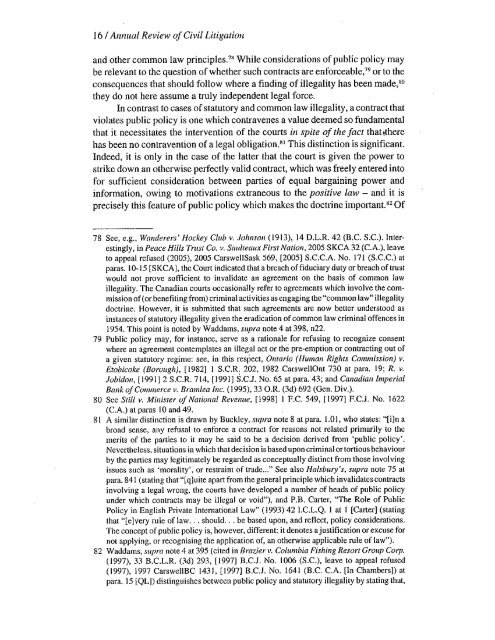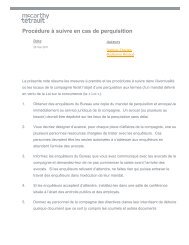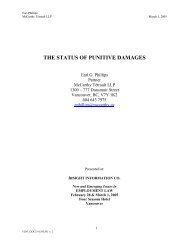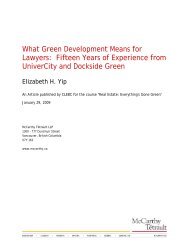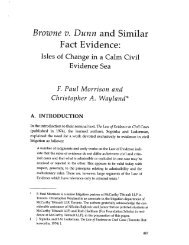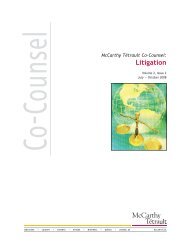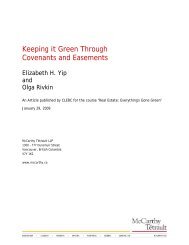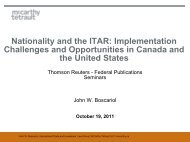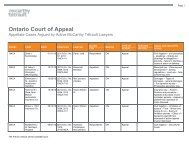The Doctrine of Public Policy in Canadian Contract Law
The Doctrine of Public Policy in Canadian Contract Law
The Doctrine of Public Policy in Canadian Contract Law
Create successful ePaper yourself
Turn your PDF publications into a flip-book with our unique Google optimized e-Paper software.
16 / Annual Review <strong>of</strong> Civil Litigation<br />
and other common law pr<strong>in</strong>ciples.78 While considerations <strong>of</strong> public policy may<br />
be relevant to the question <strong>of</strong> whether such contracts are enforceable,79 or to the<br />
consequences that should follow where a f<strong>in</strong>d<strong>in</strong>g <strong>of</strong> illegality has been made,8°<br />
they do not here assume a truly <strong>in</strong>dependent legal force.<br />
In contrast to cases <strong>of</strong> statutory and common law illegality, a contract that<br />
violates public policy is one which contravenes a value deemed so fundamental<br />
that it necessitates the <strong>in</strong>tervention <strong>of</strong> the courts <strong>in</strong> spite <strong>of</strong> the fact thattthere<br />
has been no contravention <strong>of</strong> a legal obligation.8' This dist<strong>in</strong>ction is significant.<br />
Indeed, it is only <strong>in</strong> the case <strong>of</strong> the latter that the court is given the power to<br />
strike down an otherwise perfectly valid contract, which was freely entered <strong>in</strong>to<br />
for sufficient consideration between parties <strong>of</strong> equal barga<strong>in</strong><strong>in</strong>g power and<br />
<strong>in</strong>formation, ow<strong>in</strong>g to motivations extraneous to the positive law — and it is<br />
precisely this feature <strong>of</strong> public policy which makes the doctr<strong>in</strong>e important.82 Of<br />
78 See, e.g., Wanderers' Hockey Club v. Johnson (1913), 14 D.L.R. 42 (B.C. S.C.). Interest<strong>in</strong>gly,<br />
<strong>in</strong> Peace Hills Trust Co. v. Saulteaux First Nation, 2005 SKCA 32 (C.A.), leave<br />
to appeal refused (2005), 2005 CarswellSask 569, [2005] S.C.C.A. No. 171 (S.C.C.) at<br />
paras. 10-15 [SKCA], the Court <strong>in</strong>dicated that a breach <strong>of</strong> fiduciary duty or breach <strong>of</strong> trust<br />
would not prove sufficient to <strong>in</strong>validate an agreement on the basis <strong>of</strong> common law<br />
illegality. <strong>The</strong> <strong>Canadian</strong> courts occasionally refer to agreements which <strong>in</strong>volve the commission<br />
<strong>of</strong> (or benefit<strong>in</strong>g from) crim<strong>in</strong>al activities as engag<strong>in</strong>g the "common law" illegality<br />
doctr<strong>in</strong>e. However, it is submitted that such agreements are now better understood as<br />
<strong>in</strong>stances <strong>of</strong> statutory illegality given the eradication <strong>of</strong> common law crim<strong>in</strong>al <strong>of</strong>fences <strong>in</strong><br />
1954. This po<strong>in</strong>t is noted by Waddams, supra note 4 at 398, n22.<br />
79 <strong>Public</strong> policy may, for <strong>in</strong>stance, serve as a rationale for refus<strong>in</strong>g to recognize consent<br />
where an agreement contemplates an illegal act or the pre-emption or contract<strong>in</strong>g out <strong>of</strong><br />
a given statutory regime: see, <strong>in</strong> this respect, Ontario (Human Rights Commission) v.<br />
Etobicoke (Borough), [1982] I S.C.R. 202, 1982 CarswellOnt 730 at para. 19; R. v.<br />
Jobidon, [1991] 2 S.C.R. 714, [1991] S.C.J. No. 65 at para. 43; and <strong>Canadian</strong> Imperial<br />
Bank <strong>of</strong> Commerce v. Bramlea Inc. (1995), 33 O.R. (3d) 692 (Gen. Div.).<br />
80 See Still v. M<strong>in</strong>ister <strong>of</strong> National Revenue, [1998] 1 F.C. 549, [1997] F.C.J. No. 1622<br />
(C.A.) at paras I 0 and 49.<br />
81 A similar dist<strong>in</strong>ction is drawn by Buckley, supra note 8 at para. 1.01, who states: "[i]n a<br />
broad sense, any refusal to enforce a contract for reasons not related primarily to the<br />
merits <strong>of</strong> the parties to it may be said to be a decision derived from 'public policy'.<br />
Nevertheless, situations <strong>in</strong> which that decision is based upon crim<strong>in</strong>al or tortious behaviour<br />
by the parties may legitimately be regarded as conceptually dist<strong>in</strong>ct from those <strong>in</strong>volv<strong>in</strong>g<br />
issues such as 'morality', or restra<strong>in</strong>t <strong>of</strong> trade..." See also Halsbury's, supra note 75 at<br />
para. 841 (stat<strong>in</strong>g that "[q] uite apart from the general pr<strong>in</strong>ciple which <strong>in</strong>validates contracts<br />
<strong>in</strong>volv<strong>in</strong>g a legal wrong, the courts have developed a number <strong>of</strong> heads <strong>of</strong> public policy<br />
under which contracts may be illegal or void"), and P.B. Carter, "<strong>The</strong> Role <strong>of</strong> <strong>Public</strong><br />
<strong>Policy</strong> <strong>in</strong> English Private International <strong>Law</strong>" (1993) 42 I.C.L.Q. 1 at 1 [Carter] (stat<strong>in</strong>g<br />
that "[e]very rule <strong>of</strong> law. . . should. . . be based upon, and reflect, policy considerations.<br />
<strong>The</strong> concept <strong>of</strong> public policy is, however, different: it denotes a justification or excuse for<br />
not apply<strong>in</strong>g, or recognis<strong>in</strong>g the application <strong>of</strong>, an otherwise applicable rule <strong>of</strong> law").<br />
82 Waddams, supra note 4 at 395 (cited <strong>in</strong> Brazier v. Columbia Fish<strong>in</strong>g Resort Group Corp.<br />
(1997), 33 B.C.L.R. (3d) 293, [1997] B.C.J. No. 1006 (S.C.), leave to appeal refused<br />
(1997), 1997 CarswelIBC 1431, [1997] B.C.J. No. 1641 (B.C. C.A. [In Chambers]) at<br />
para. 15 [QL]) dist<strong>in</strong>guishes between public policy and statutory illegality by stat<strong>in</strong>g that,


